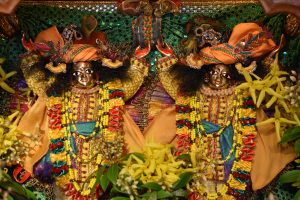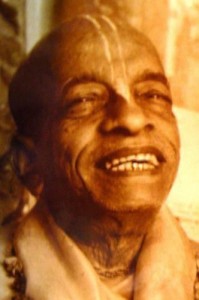
July 31 1975 New Orleans
Prabhupāda: Why the prison house is filled up with so many criminals?
Guest: Why the prison house is filled up?
Prabhupāda: Prison house. In the state.
Guest: With so many prisoners?
Prabhupāda: Yes.
Guest: Of course, many people are committing crimes.
Prabhupāda: Yes. So that committing crimes is his option or government canvasses that “You become criminal and give up”?
Guest: His option.
Prabhupāda: That’s it. It is your option. You rot in this material world or go back to home, back to Godhead. That is your option. It is open to you both ways. You go to hell or go to heaven. That is your option. So human life is meant for selecting—”What shall I do? I shall go to hell or heaven?” And that is purpose. If you want to go to hell, you can go.
Guest: What does Kṛṣṇa say about truth?
Prabhupāda: Kṛṣṇa is truth. Without Kṛṣṇa, everything is untruth. Truth is one. Just like zero is zero. And it is added with one, then it is ten. It is truth. So zero is zero always. Hundred million times zero—it is zero. But when there is one, immediately value increases. So without Kṛṣṇa, all this material advancement, they are all zeros. But if you bring Kṛṣṇa, then it… that increases value-ten, hundred, thousand, tens of thousands, like that, million, billions. Because the one is there. So bring Kṛṣṇa, and then everything will be value. Otherwise, all zero. You may be proud of so-called material advancement. It is zero, because it will not save you, because tathā dehāntara-prāptiḥ: [Bg. 2.13] you have to change your body. So you have earned so much millions and billions of money. That’s all right. But you have to go empty-handed. The money will remain here. You cannot take that money within the tomb. That is not possible. Then it is zero. You are going empty-handed. You came empty-handed and going empty-handed. You came with zero and you are going with zero. So whatever you have earned, that is zero. But if you have attempted to serve Kṛṣṇa with all these zeros, then you have taken some value. Then Kṛṣṇa will see: “Oh, he has done so much for Me. Let him come.” Otherwise zero. What is the value of your skyscraper building and billions of dollars in the bank? You cannot take it with you. And this is called māyā. You cannot take it with you; still, you are struggling hard day and night. This is called māyā. Not a single farthing you will be able to take with you, and still, you are simply happy. They are called “asses.” Just like asses, they have so much big burden, but nothing of the burden belongs to him. Mūḍha. They are called mūḍha, asses. For nothing happiness, which he will never be able to take with him. What do they say? They are doing it for next generation.
Guest: Posterity.
Prabhupāda: He is not interested for himself. He is interested for his generation, which he will kill as soon as he’s rebellious. Just see the argument.
Devotee (1): Prabhupāda, should everyone move to the temple?
Prabhupāda: Why?
Devotee (1): Live here?
Prabhupāda: Not necessarily. Invite him. But who is coming here? Nobody is coming.
Devotee (2): Śrīla Prabhupāda, you are seeing Kṛṣṇa at every moment. Does this mean you are seeing Kṛṣṇa in His two-armed form playing the flute at every moment?
Prabhupāda: What do you think?
Devotee (2): I don’t know, Śrīla Prabhupāda.
Prabhupāda: Then? Seeing means Kṛṣṇa as He is. That’s all. Santaḥ sadaiva hṛdayeṣu vilokayanti. You never read Brahma-saṁhitā? Do you read?
Devotee (2): Yes, Prabhupāda. What you have of the Brahma-saṁhitā in your books.
Prabhupāda: Brahma-saṁhitā it is said, santaḥ sadaiva hṛdayeṣu vilokayanti. Those who are saintly persons, they always see Kṛṣṇa within his heart. Everyone can see if he tries. Why you and me? Anyone can see. Kṛṣṇa is open to everyone. But He is not open to the rascals. That is Kṛṣṇa’s distinguish… Nāhaṁ prakāśaḥ sarvasya yoga-māyā-samāvṛtaḥ [Bg. 7.25]. He is open to everyone, but not to all others, only to the devotee.
Devotee (3): Śrīla Prabhupāda, the Paramātmā feature is in the heart.
Prabhupāda: Yes.
Devotee (3): And the pure devotee, does he see the Paramātmā feature or does he see…?
Prabhupāda: When you see Kṛṣṇa, you see Paramātmā, Brahman, everything. Brahmeti paramātmeti bhagavān iti śabdyate [SB 1.2.11]. If you see… Just like when you see the sun, you see sunlight also. The sun… We see the sun globe, the sun light, simultaneously. Nobody says, “I am seeing the sun but not the sunshine.” Is it? (laughter) He is seeing everything. He is seeing everything.
Devotee (3): But does he focus his mind upon the two-armed…?
Prabhupāda: There is no question of focus or no focus. One who sees Kṛṣṇa, he sees everything. Yasmin vij�āte sarvam evaṁ vij�ātaṁ bhavanti. There is no question of imagination. This is fact. What is that?
… Yes. One who is foolish, nonintelligent, he cannot see Kṛṣṇa. Means Kṛṣṇa does not reveal to him. They never see. Next?
Satsvarūpa: “For them I am covered by My eternal creative potency, yogamāyā, and so the deluded world knows Me not, who am unborn and infallible.”
Prabhupāda: If you have no qualification to see Him, even Kṛṣṇa comes before you, you cannot see. You will see Him—”Oh, He’s an ordinary man like me,” because you are not qualified to see Him. But when you become qualified, you will see Him always. Kuntidevi said, “Kṛṣṇa, You are within and without; still, they cannot see You.” If Kṛṣṇa is within and without, there are two things. Still, the example is given, naṭo nāṭya-dharo yathā. Just like a friend or a family member playing on the stage, and somebody says that “Your brother is playing.” “Oh, where is my brother? Where is my brother?” “He is just playing this part, taken this part.” “Oh.” So he requires the help. Otherwise he cannot see. Even he sees his brother or father playing on the stage, he cannot see. The example is very nice. Naṭo nāṭya-dharo yathā. He sees his brother at home, but he cannot see on the stage. Everything requires qualification. Therefore this Kṛṣṇa consciousness movement is meant for qualifying you to see God twenty-four hours. This is sum and substance of Kṛṣṇa consciousness. If you learn this art, then you will see God twenty-four hours, without any stop.
What is the devotees greatest enemy?
June 12 1974 Paris
The bhakti means more realization of God and forgetting this, all this nonsense. That is bhakti. That is the test of bhakti: how much you have become disinterested with this material advancement. That is bhakti, advancement of bhakti. And the… Caitanya Mahāprabhu therefore says, niṣki�canasya. At last, when you’ll feel that “Now I am dispossessed of all this material nonsense,” then you make progress. And so long you’ll feel “I have got this, I have got that, I am in possession of this, I…,” that means your material disease is continuing. When you’ll feel that “I do not have anything material,” that is the beginning of Bhāgavata-dharma.
Devotee: Prabhupāda, what is the devotee’s greatest enemy? A devotee’s greatest enemy?
Prabhupāda: He, he himself. Because he’s a rascal, he’s his greatest enemy. So just get out of this rascaldom, and you become your friend. Nobody is enemy. You are yourself your enemy. Nobody is enemy. (pause) Which one?
Some Conclusions—The whole gist of Prabhupadas message is that we have choices all the time to chose either Krsna or Maya. But if we think like this….“And so long you’ll feel “I have got this, I have got that, I am in possession of this, I…,” that means your material disease is continuing. When you’ll feel that “I do not have anything material,” that is the beginning of Bhāgavata-dharma.
So by constant chanting chanting chanting Hare Krsna maha mantra and associating regularly with good devotees, gradually this diseased mentality will disappear. This is the formula and this is the process, otherwise if Krsna Himself appears before us and He can come in any form He may chose, if we are not Krsna Conscious we will still not be able to see Him.
Hare Krsna
damaghosa das


